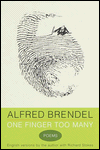
One Finger Too Many
One Finger Too Many Alfred Brendel (Trans. Richard Stokes) Random House New York 1998 71pp $16.00 0375502939
Merchandise Links
US Edition: |
Alfred Brendel’s wonderfully antic poems tend toward the unusual if not the downright weird. His is a poetry squarely in the Dadaist tradition, characterized by fantastic or incongruous creations and by nihilistic satire. To help assure that his poems speak on their own terms, Brendel denies the reader the clues titles generally provide, even admitting their sometimes postmodern function of obfuscating rather than elucidating a poem’s meaning or intention. (Titles are given at the back of the book, however. ) The import of this absence can be appreciated by imagining, for example, how differently ‘The Waste Land’ might have been received or understood had Eliot not supplied a title. In most instances titles tell us what is intended. They conventionally prefigure a poem’s meaning. In their absence we perforce approach a poem with less preconceptions. And Brendel’s poems mean to challenge our preconceptions about the way things are and how they work.
Notably humorous on its surface, there is an undercurrent of dread in One Finger Too Many. On occasion this becomes explicit as in ‘Disaster,’ which enumerates in simple declarative sentences a series of major and minor debacles. None has anything to do with the others except they happen to the same family, are accepted with equanimity, and fall under the rubric of disasters. To cite several at random: ‘the family portrait fell from the wall’; ‘Dorothy disgraced herself with the chauffeur’ (I love the Victorian tone here); ‘All the bulbs exploded.’ Collectively these sundry bad tidings are funny enough. But the poem’s final two lines render everything that went before especially delightful. ‘Someone started playing the trombone/That really was too much.’
Another example of a dark experience rendered in a light way is the aptly named ‘Crocodile.’ A big game hunter falls into a river. Most of the poem describes the crocodile’s musings about how best to devour this unexpected gift. But while the croc considers its options the hunter manages to swim back to the riverbank ‘where /I’m sorry to say/he was eaten by a lion.’ What tickles me most here is the mock-humility of the line, ‘I’m sorry to say.’ Of course, Brendel is not really sorry; his poem is a parable for the truth that we cannot finally escape. Humor may make life’s transience more bearable but it cannot prevent it.
In a biographical note we learn that Mr. Brendel is one of ‘this century’s most widely respected pianists and classical recording artists, performing on the major concert stages of the world.’ One Finger Too Many is his first book of poetry in English (he has previously published two collections of musical essays) and, as to be expected, musical themes weave through the collection. The first poem, providing the book’s title, describes a pianist who developed a third index finger and the surprising uses to which he puts the extra digit. It makes one wonder what concert pianists are really thinking about when they seem so totally absorbed in the music. In ‘Brms’ the narrator imagines letting loose with a fire hose at the front row of concert goers. Ghosts of great composers float through the book, playing a piano badly, bedeviling a woman in characteristic ways from Liszt’s silken seductive gestures to Mozart’s boorish overtures. Other poems involve a woman who mistakes the author for Woody Allen (one can spot a certain resemblance in the jacket photo), encounters with various animals who act or become human, and several love poems that show the author’s capacity to write in more than one key.
My one quibble about this delightful book is the absence of the original German. To include such facing pages may have been too costly or perhaps the poems, as the jacket blurb ‘English versions’ suggests, were considered less as translations than as new versions. Still, even where the original author collaborates, as the case here, with a native speaker (Richard Stokes), it is always instructive to see the choices made in moving from one language to another. Be that as it may, however, these poems stand on their own in their considerable power to charm and surprise.
Reviewed by Jerry Bass
